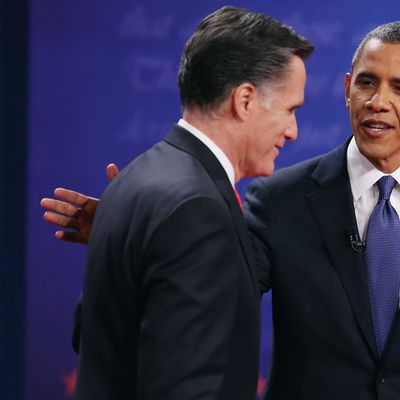
President Obama’s first debate was disastrous in two distinct ways. He appeared listless and professorial, unable to boil down his beliefs into crisp statements, and generally looked far less like a president than did Romney — forceful, poised, firing off bullet points with measured assurance. On top of that, he allowed Romney to execute, in the course of 90 minutes, the sort of ideological repositioning he usually requires months or even years to pull off, defining himself to middle America as a health-care-loving, tax-cut-for-the-rich-abhorring, anti–Wall Street Massachusetts moderate.
Obama’s dilemma in his second debate is that he can fix the first problem a lot more easily than the second.
A town hall debate is not really a debate. It is a kind of competitive question-answering show. The format revolves around undecided voters tossing queries at the candidates. The whole gestalt of the program is to privilege interaction between the candidates and the regular people speaking with them — for them to press each other with queries makes them look like they are avoiding the questions. Worst still, voters can be counted on to implore them to stop attacking each other and just get along.
And so the opportunities to expose the omissions and outright falsehoods in Romney’s repositioning will be vastly more limited than they were in the first debate, and the risks of attacking them much greater. This isn’t to say Obama can’t try to take Romney apart, only that the potential for such attacks to backfire is both large and — here is the crucial thing — uncertain.
The town hall debate, like all debates, is governed by fairly elaborate rules (explained in this long, lawyerly memo). But the rules aren’t really rules. The only technical enforcement mechanism is that the moderator is instructed to announce that a candidate has violated a rule. The only real measure is what the viewing audience thinks. You can fight as dirty as you want as long as the people in their living rooms think you’re fighting clean — or, alternatively, you can fight perfectly clean but still run the risk of coming off dirty. And how something will come off on television, perhaps after mediation via the Twitterized hive mind of the campaign press corps, is impossible to predict.
Some aspects of the performance clearly lie within Obama’s control. He can speak more crisply. He can resist his natural temptation to work within his opponent’s intellectual frame, and take up Joe Biden’s successful tactic of working from his own premises. But if he wants to tear into Romney’s elaborate rhetorical façade, he is putting himself at the mercy of a random and unpredictable dynamic.






























